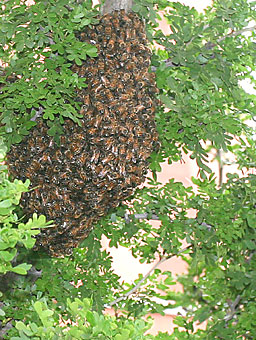 |
|
Lisa Rich/Arizona Daily Wildcat
|
Bunches of bees swarm together in a mesquite tree outside the Gould-Simpson building yesterday. Bees swarm together in the fall and winter months to keep warm, but it is unusual for this time of year.
|
|
|
Arizona Daily Wildcat
Wednesday, October 19, 2005
Print this
UA professor wins $600K to help prevent colorectal cancer deaths
A UA professor has become the first Arizonan to win a $600,000 professorship award from the American Cancer Society.
The Richard H. Hollen Cancer Prevention Professorship was awarded to the co-director of the Arizona Cancer Center's Cancer Prevention and Control Program, epidemiology and nutrition professor María Elena Martínez.
Martinez won the award for her proposal, "Development of a Program to Increase Colorectal Cancer Screening in Arizona."
Martínez's goal in the proposal is to raise the rates of age-eligible Arizonans who are getting screened for the cancers from the current national lows of 30 percent to 50 percent, to 75 percent by the year 2010, according to a press release.
"The state of the problem is that the rates of colorectal screening are low throughout the country," Martínez said. "We are not getting the message out there."
Donna Breckenridge, the director of communication for the Arizona Cancer Center, said the program could save the lives of people who could otherwise be killed by a preventable disease.
"If you get a colonoscopy regularly, your chances of surviving an instance of colon cancer are just so much better," Breckenridge said.
In order to accomplish her goal, she and her group will use a "multifaceted" program that includes getting primary care physicians involved, launching public programs in places like American Indian reservations and possibly doing media campaigns, Martínez said.
"It's not just enough to educate at the office," Martínez said.
Martínez said there are many facts about colorectal cancer and cancer screenings many people aren't aware of.
"This is the second(-leading) cause of cancer deaths in the U.S. in both women and men," Martínez said. "Removing lesions that could become cancer reduces risk by 70 to 80 percent. That awareness is out there. We need to be there as well."
- Ariel Serafin
Law demands bee swarm's demise
The swarm of Africanized bees outside the Gould-Simpson building Monday afternoon was removed and killed by a beekeeper without reports of anyone getting stung.
When the university has reports of bee swarms, it relies on beekeeper Kent Griffith of Catalina Bee Removal to take care of the swarms and infestations that could potentially harm people on campus, said Christopher Kopach, associate director of Facilities Management.
When Facilities Management gets reports of bee swarms on campus, it blocks off the area and calls Griffith, who immediately kills the bees with a soapy water solution that suffocates them, Smith said.
Griffith has to kill the bees because of Pima County Code 8.40.10, which states that bees or wasps must be killed if they infest or linger in any public area that could pose a health threat to humans.
According to the code, "No persons shall cause, maintain or within his control permit such infestation," which means the infestation must be destroyed, Griffith said.
If he doesn't destroy the Africanized bees, they will become aggressive and become harder to remove, Griffith said.
In the past six days, Griffith said he has responded to 15 swarms and infestations on the UA campus.
- Danielle Rideau
